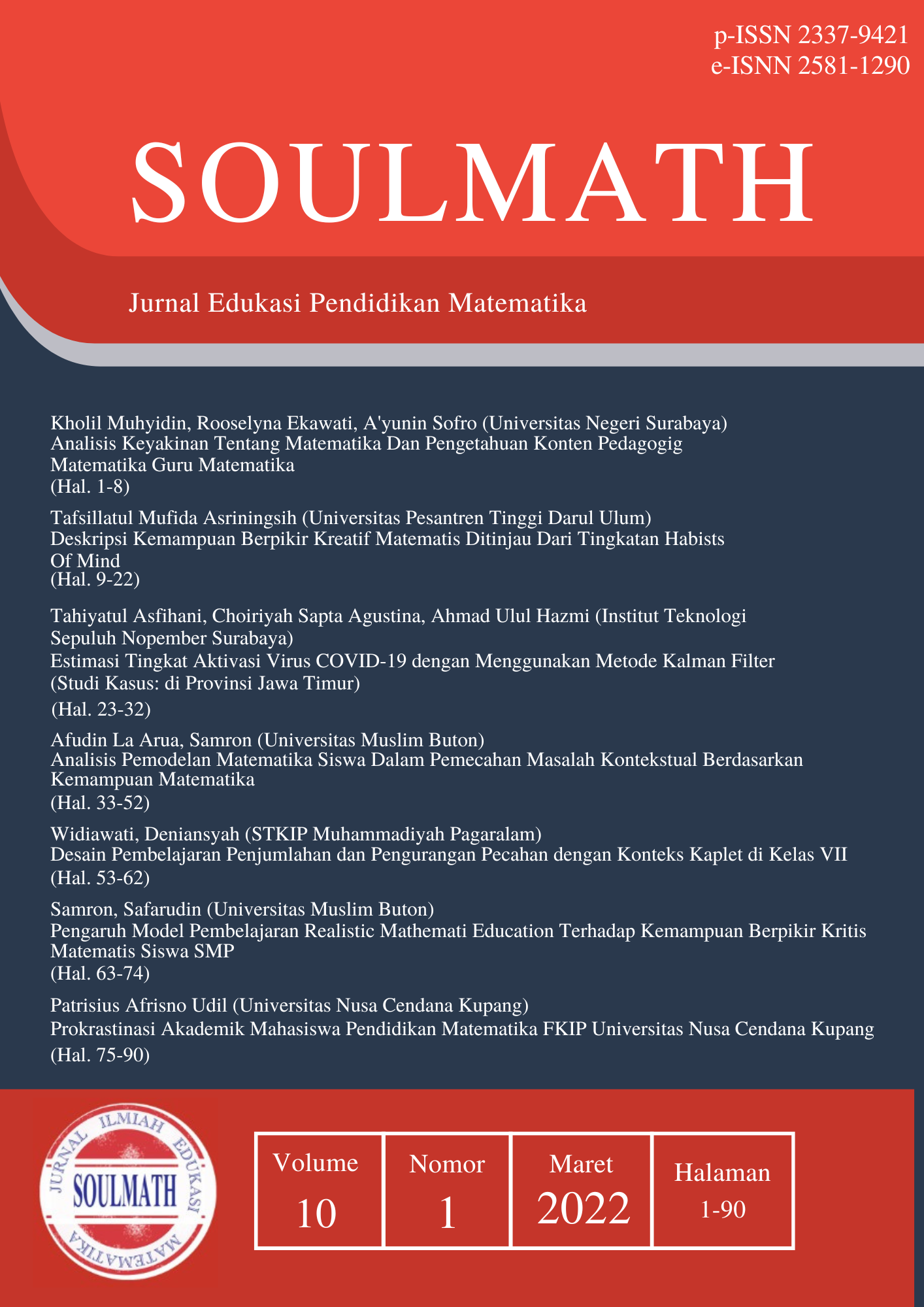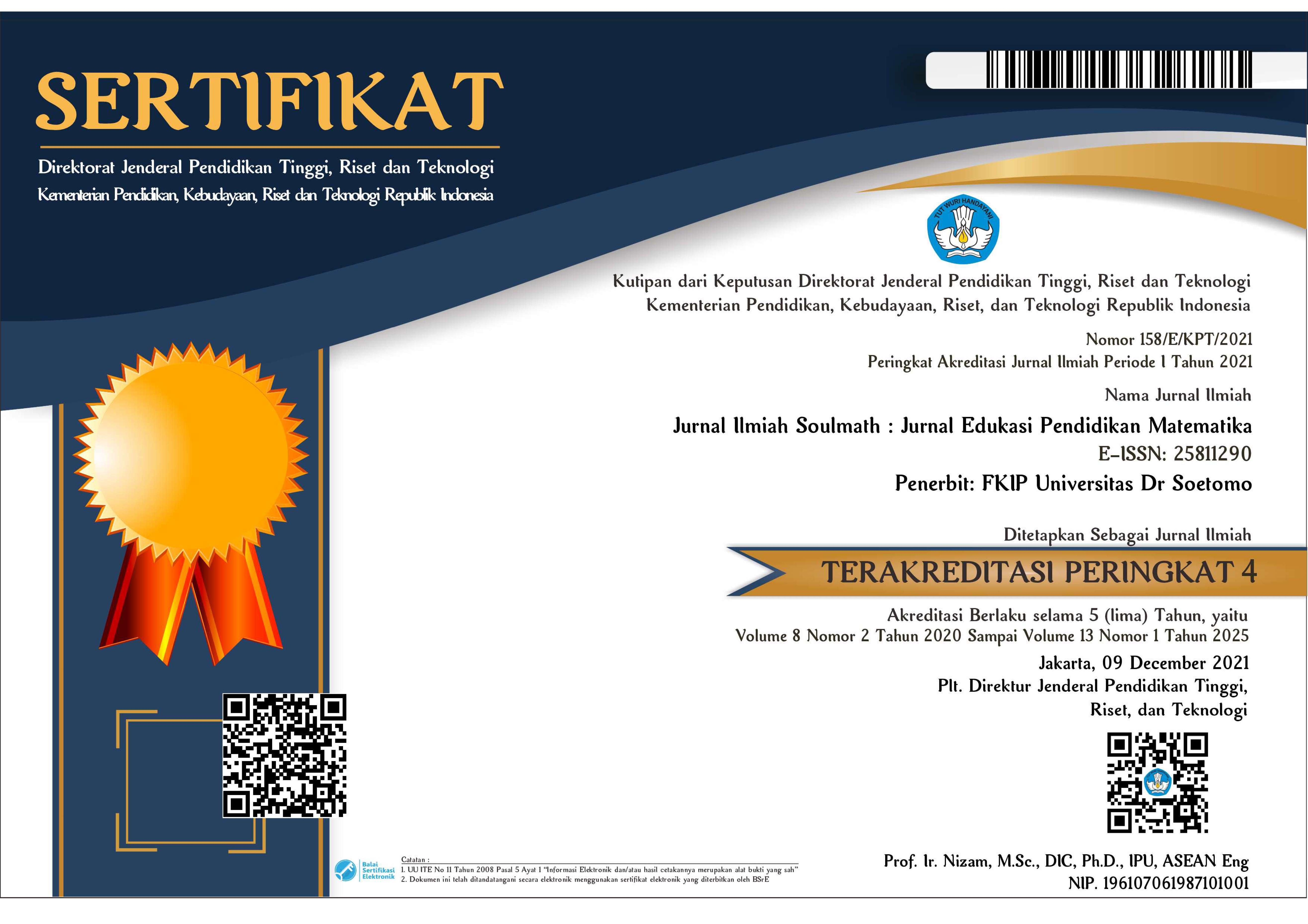Analisis Keyakinan Tentang Matematika Dan Pengetahuan Konten Pedagogik Matematika Calon Guru Matematika
 Abstract views: 208
,
Abstract views: 208
,
 3939 publish (Bahasa Indonesia) downloads: 192
3939 publish (Bahasa Indonesia) downloads: 192
Abstract
Abstract
This study aims to determine whether there is a relationship between beliefs about mathematics and mathematics pedagogical content knowledge possessed by mathematics teachers on the ratio material and explanations of prospective teachers' mathematics pedagogic content based on the beliefs about mathematics drawn. This research used by Mixed Method. With a sample of 31 students who took micro teaching courses. from the sample, each subject who has a view on instrumentalist, platonic, and problem-solving mathematics is selected. Data were collected by presenting beliefs, mathematics pedagogical content knowledge tests, and interviews. Statistical data analysis by using rank-spearman correlation test. The results of research showed that there was no relationship between beliefs about mathematics and mathematics pedagogical content knowledge of prospective mathematics teachers. Prospective teachers mathematics who have a view of instrumentalist and problem solving mastered almost all indicators that exist in the component of mathematics pedagogical content knowledge. Meanwhile, prospective teachers mathematics who have a view of platonic have almost not mastered all the indicators that exist in the component of mathematics pedagogical content knowledge.
Downloads
References
M. Cox, “Knowledge and Teaching : Foundations of the New Reform,” Harvard educational review, vol. 57, no. 1. pp. 1–22, 1987.
L. Ma, Knowing and Teaching Elementary Mathematics. 2020.
F. Kuiken and I. Vedder, “Noticing and the role of interaction in promoting language learning,” Investig. Instr. Second Lang. Acquis., vol. 55, no. April, pp. 353–381, 2008.
P. Ernest, “The impact of beliefs on the teaching of mathematics,” Math. Teach. state art, no. 1980, pp. 249–254, 1989.
P. Ernest, “The Knowledge, Beliefs and Attitudes of the Mathematics Teacher: a model,” J. Educ. Teach., vol. 15, no. 1, pp. 13–33, 1989.
R. a Philipp, “Mathematics teachers’ beliefs and affect,” Second Handb. Res. Math. Teach. Learn., pp. 257–315, 2007.
F. Furinghetti, “2002 - Rethinking characterizations of beliefs CHAPTER 3 Fulvia Furinghetti and Erkki Pehkonen RETHINKING CHARACTERIZATIONS OF BELIEFS,” no. January 2002, pp. 39–57, 2016.
K. Beswick, “The beliefs/practice connection in broadly defined contexts,” Math. Educ. Res. J., vol. 17, no. 2, pp. 39–68, 2005.
S. Herlinda et al., “Metodologi Penelitian,” Lemb. Penelit. Univ. Sriwij., pp. 1–25, 2010.
R. Ekawati, F. L. Lin, and K. L. Yang, “Primary teachers’ knowledge for teaching ratio and proportion in mathematics: The case of Indonesia,” Eurasia J. Math. Sci. Technol. Educ., vol. 11, no. 3, pp. 513–533, 2015.
Muhtarom, D. Juniati, and T. Siswono, “Pengembangan Angket Keyakinan Terhadap Pemecahan Masalah dan Pembelajaran Matematika,” J. Ilm. Pendidik. Mat., vol. 2, no. 1, pp. 55–64, 2017.
R. Mosvold and J. Fauskanger, “Teachers’ beliefs about mathematical knowledge for teaching definitions,” Int. Electron. J. Math. Educ., vol. 8, no. 2–3, pp. 43–61, 2013.







